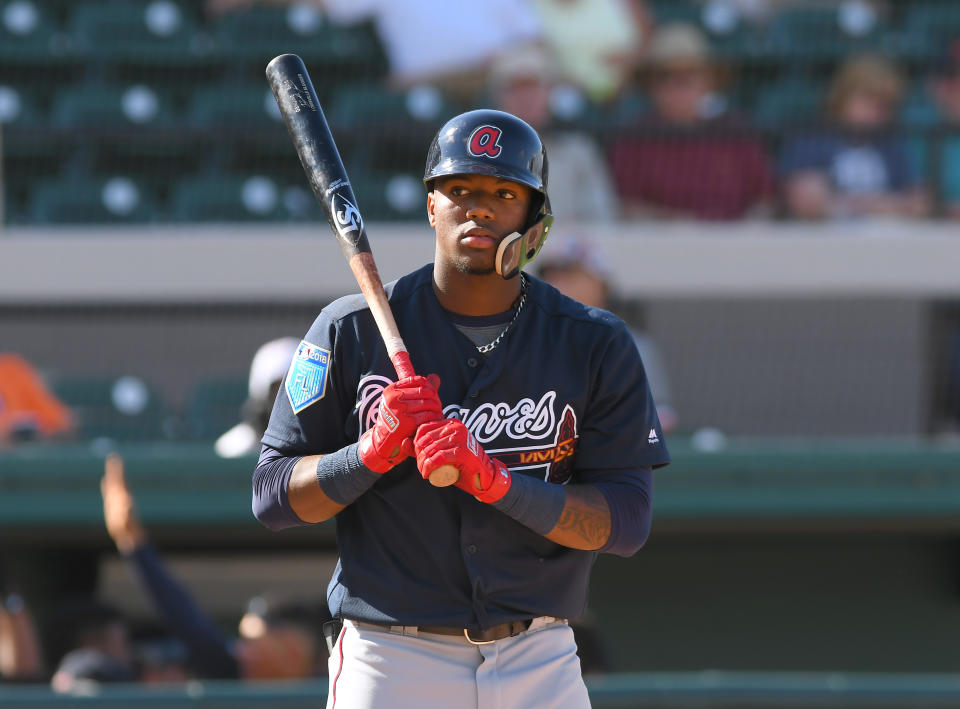Ronald Acuña getting sent down offers more proof the system needs to change
Atlanta Braves top prospect Ronald Acuña is more than ready for the majors. The 19-year-old tore through the minors last season, hitting a blistering .344 in limited time at Triple-A. He then proved that wasn’t a fluke this spring, smacking around major-leaguers for a .432 average in 44 at-bats.
You would think that would be enough for Acuña to open the year as a starting outfielder for the Braves. It wasn’t. Acuña was sent to Triple-A on Monday.
Anyone who is familiar with Major League Baseball service time rules knew this would happen. No matter how well Acuña played this spring, he was always going to be sent to the minors.
MLB players are granted free agency after they’ve accumulated six full seasons of service time. One year of service time equals 172 days on a major-league roster, and that’s an extremely important number for elite prospects.
MLB keeps track of their service time meticulously. If you go to Bryce Harper’s Baseball-Reference page right now, you’ll see he’s accumulated 5.159 years of service time.
Players only reach free agency after they have exceeded 6.000 seasons of service time. There are usually more than 172 days in a major-league season. In order to prevent an elite prospect from reaching a full season of service, teams send them down until they cannot accumulate a full season of service time. That enables the team to keep that player for an additional season later in his career.

Take Acuña, for example. By sending him down until April 13, he’ll be on the Braves’ roster for no more than 171 days. Instead of Acuña reaching free agency after six years in the majors, he would get there after seven. The Braves get a full year of Acuña in his prime for keeping him in the minors for about two weeks to start the year.
That practice should seem familiar by now. The Chicago Cubs sent Kris Bryant down to work on his defense in 2015. He was called up just after the point where the team gained another year of control.
In order to justify that tactic, and not make it look like service-time manipulation, teams usually give a reason for the move. For Acuña, it’s getting him “more development time.”
Anthopoulos on Acuña: "the more we talked about it organizationally, from a philosophical standpoint, having more development time, no one's ever been hurt by that. We do feel like it's probably best overall from a philosophical standpoint to get him more development time"
— 680 The Fan & 93.7FM (@680TheFan) March 19, 2018
Acuña has nothing left to prove in the minors. He’s merely starting his season there so the Braves can get an extra year of control out of him.
This is not a secret. Mark Bowman, who covers the Braves for MLB.com, acknowledged as much.
The Braves informed Acuna of the decision after today's game. The heralded prospect will have to remain in the Minors until at least April 13 for the Braves to gain an extra year of contractual control.
— Mark Bowman (@mlbbowman) March 19, 2018
Everyone knows why teams send down elite prospects, and it’s not for “development.” But teams can’t be honest without drawing the ire of the MLB Players Association.
When Bryant was sent down by the Cubs, the players union sent out a release calling it a “bad day for baseball.” Bryant and Philadelphia Phillies third baseman Maikel Franco filed grievances about their service time being manipulated. Those grievances went nowhere. Bryant moved on after a year and the service time issue was supposed to be addressed in the collective-bargaining agreement. It wasn’t. Three years later, the same thing is happening to Acuña.
It’s not as if the Braves have other options. With Acuña in Triple-A, Preston Tucker is slated to open the year as their left fielder. Tucker has hit .214/.274/.403 over 467 plate appearances in the majors. There’s no argument that he’s better than Acuña right now.
From the Braves’ perspective, this is the smart move. The team is not expected to contend in 2018, so sitting Acuña for a handful of games means nothing to them now. The extra year of control later is far more valuable to them.
While it’s a wise move on the Braves’ end, it’s done in bad faith. The best players don’t get promoted when they are ready, they get promoted when it’s most convenient for the team.
Everyone knows this. But no one is fighting it.
The Braves are willingly running out a team without one of their best talents early in 2018. It’s insulting to Acuña, and it’s insulting to Braves fans. And no one with the power to change things is going to do anything about it.
– – – – – – –
Chris Cwik is a writer for Yahoo Sports. Have a tip? Email him at christophercwik@yahoo.com or follow him on Twitter! Follow @Chris_Cwik
More from Yahoo Sports:
• Minor-league baseball players may be exempt from federal labor laws soon
• Brewers awesome shot-for-shot remake of ‘Sandlot’ scene features surprise cameo
• Rangers pitcher gets revenge on bull that startled him: ‘I killed him and I ate him’
• Twins lose shortstop Jorge Polanco for 80 games after positive steroid test

